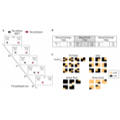Abstract
The human brain carries out cognitive control for the inhibition of habitual behaviors by suppressing some familiar but inappropriate behaviors instead of engaging specific goal-directed behavior flexibly in a given situation. To examine the characteristics of neural dynamics related to such inhibition of habitual behaviors, we used a modified rock–paper–scissors (RPS) task that consisted of a basic, a lose-, and a win-conditioned game. Spectral and phase synchrony analyses were conducted to examine the acquired electroencephalogram signals across the entire brain during all RPS tasks. Temporal variations in frontal theta power activities were directly in line with the stream of RPS procedures in accordance with the task conditions. The lose-conditioned RPS task gave rise to increases in the local frontal power and global phase-synchronized pairs of theta oscillations. The activation of the global phase-synchronized network preceded the activation of frontal theta power. These results demonstrate that the frontal regions play a pivotal role in the inhibition of habitual behaviors—stereotyped and ingrained stimulus–response mappings that have been established over time. This study suggests that frontal theta oscillations may be engaged during the cognitive inhibition of habitual behaviors and that these oscillations characterize the degree of cognitive load required to inhibit habitual behaviors.
